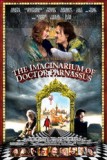| Reviews & Columns |
|
Reviews DVD TV on DVD Blu-ray 4K UHD International DVDs In Theaters Reviews by Studio Video Games Features Collector Series DVDs Easter Egg Database Interviews DVD Talk Radio Feature Articles Columns Anime Talk DVD Savant Horror DVDs The M.O.D. Squad Art House HD Talk Silent DVD
|
DVD Talk Forum |
|
|
| Resources |
|
DVD Price Search Customer Service #'s RCE Info Links |
|
Columns
|
|
|
Imaginarium of Doctor Parnassus, The
Few directors' work is as immediately and readily identifiable as that of Terry Gilliam. The opening scenes of his new picture The Imaginarium of Doctor Parnassus are jam-packed with jaunty angles, trick lenses, and extreme compositions. Gilliam isn't making any apologies; as with his last film, the fascinating but unapproachable Tideland, he's making the film he wants to make, logic and common sense be damned. As with that film, Doctor Parnassus will likely embolden his detractors and reinvigorate his admirers--and though I'd consider myself to be more the latter than the former, it must be said that his bag of tricks is getting mighty shallow.
Tideland came and went with little fanfare in 2005, and Doctor Parnassus might well have suffered the same fate, were it not the final film appearance of Heath Ledger. The late actor plays Tony, a mysterious stranger whose hanging body is discovered by the titular company, a traveling caravan led by the good doctor (Christopher Plummer). Their show, frequently set up in parking lots and other undesirable locations, is a chintzy sideshow with one magical element: a mirror that allows audience members to take a journey beyond reality and into their own imagination. Tony is a bit of enigma, seemingly on the run, and he welcomes the opportunity to disappear into the company, though their future may be in jeopardy, thanks to Dr. Parnassus' long-ago deal with the Devil (Tom Waits).
The picture has its pleasures--the funhouse atmosphere is infectious, Plummer makes for a marvelously stumblebum medicine man, equally wise and inebriated, and it is indeed hard to resist any film that features Waits (sporting a natty pencil-thin mustache, no less) as Beelzebub. But it's something of a mess, from a storytelling point of view--the scenes are all sort of jammed up next to each other, like puzzle pieces that don't quite fit, and Gilliam seems to change his mind about what kind of film he wants to make approximately every 15 minutes. Gilliam's self-penned screenplays (he wrote this one with Charles McKeown, his collaborator on The Adventures of Baron Munchausen and Brazil) have never exactly been a model for narrative efficiency, but this one is all over the damned place.
Some of that may be due to the mid-film rewrites necessitated by Ledger's untimely death, though he remains in quite a bit of the film. It seems that the bulk of his unfinished work was in the fantasy, through-the-magic-mirror sequences; friends and admirers Johnny Depp, Jude Law, and Colin Farrell step in to play the character in that altered state. Their presence is both welcome and a distraction--in a normal film, it would pull us out of the narrative, reminding us that Ledger is no longer with us and that's why he's not in these scenes, but the narrative is so rambling and disorganized that it doesn't make a hell of a lot of difference.
The fantasy sequences are frequently self-indulgent and near-nonsensical, but they also have some of the energy and anarchic spirit of Gilliam's Python animations. The company's quaintly low-tech stagecraft seems a deliberate callback to the opening scenes of Baron Munchausen, while the trips inside the mirror ape that film's flights of fancy as well. Gilliam seems to be repeating himself here, repurposing his earlier ideas and visual motifs in an attempt to create something new and distinctive. But he's only exploding his least attractive qualities; while Time Bandits and Brazil had a wonderful sense of controlled chaos, his best films of recent years have been those, like The Fisher King and 12 Monkeys, in which his visual gifts were tethered to a strong, compelling screenplay--by another, more disciplined writer. His fights with studio brass are legendary, but more often than not, when let loose in the candy store, Gilliam tends to burn the mother down. He certainly does so in The Imaginarium of Doctor Parnassus, albeit in a sporadically entertaining fashion.
Doctor Parnassus may very well find success with audiences who find it appropriate accompaniment to a mind-altering experience (as his adaptation of Fear and Loathing in Las Vegas did), but most audiences will find it muddled and silly. As a de facto tribute to Ledger (who is, I have not mentioned, quite good in the picture), it is certainly heartfelt and valuable; as a cogent piece of storytelling, it misses by a mile. It doesn't work, but it doesn't lose our interest either--it's aimless, but it sure as hell ain't boring.
Jason lives in New York. He holds an MA in Cultural Reporting and Criticism from NYU.
|
| Popular Reviews |
| Sponsored Links |
|
|
| Sponsored Links |
|
|
| Release List | Reviews | Shop | Newsletter | Forum | DVD Giveaways | Blu-Ray | Advertise |
|
Copyright 2024 DVDTalk.com All Rights Reserved. Legal Info, Privacy Policy, Terms of Use,
Manage Preferences,
Your Privacy Choices | |||||||











